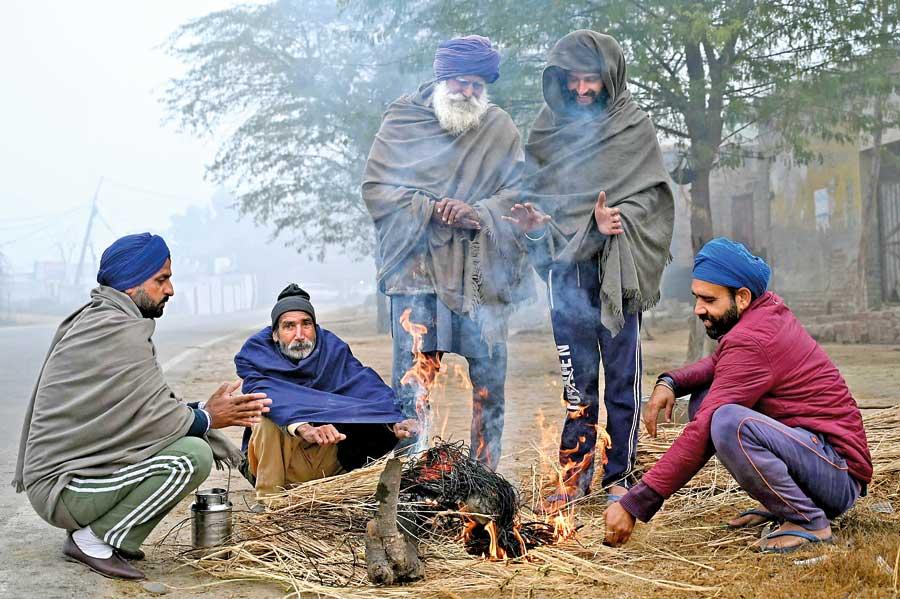28 Dec 2022 - {{hitsCtrl.values.hits}}

Villagers sit around a bonfire on a foggy winter day on the outskirts of Amritsar, India (AFP)
- On the year that humanity welcomed its eighth billion member, UN Secretary-General Antonio Guterres warned that the planet was on a “highway to climate hell’’
- A December conference in Montreal on biodiversity produced a major deal to protect 30 percent of the world’s land and seas, with China leading the way
For thousands of years, predictions of apocalypse have come and gone. But with dangers rising from nuclear war and climate change, does the planet need to at least begin contemplating the worst? When the world rang in 2022, few would have expected the year to feature the US president speaking of the risk of doomsday, following Russia’s threats to go nuclear in its invasion of Ukraine.
the worst? When the world rang in 2022, few would have expected the year to feature the US president speaking of the risk of doomsday, following Russia’s threats to go nuclear in its invasion of Ukraine.
“We have not faced the prospect of Armageddon since Kennedy and the Cuban missile crisis” in 1962, Joe Biden said in October.
And on the year that humanity welcomed its eighth billion member, UN Secretary-General Antonio Guterres warned that the planet was on a “highway to climate hell.” In extremes widely attributed to climate change, floods submerged one-third of Pakistan, China sweat under an unprecedented 70-day heatwave, and crops failed in the Horn of Africa -- all while the world lagged behind on the UN-blessed goal of checking warming at 1.5 degrees Celsius above pre-industrial levels.
Charting worst-case climate risks
UN experts estimated ahead of November talks in Egypt that the world was on track to warming of 2.1 to 2.9 C -- but some outside analysts put the figure well higher, with greenhouse gas emissions in 2021 again hitting a record despite pushes to renewable energy.
Luke Kemp, a Cambridge University expert on existential risks, said the possibility of higher warming was drawing insufficient attention, which he blamed on the consensus culture of the UN’s Intergovernmental Panel on Climate Change and scientists’ fears of being branded alarmist.
“There has been a strong incentive to err on the side of least drama,” he said.
“What we really need are more complex assessments of how risks would cascade around the world.” Climate change could cause ripple effects on food, with multiple breadbasket regions failing, fueling hunger and eventually political unrest and conflict.
Kemp warned against extrapolating from a single year or event. But a research paper he co-authored noted that even a two-degree temperature rise would put the Earth in territory uncharted since the Ice Age.
Using a medium-high scenario on emissions and population growth, it found that two billion people by 2070 could live in areas with a mean temperature of 29 C (84.2 F), straining water resources -- including between India and Pakistan.
Cases for optimism
The year, however, was not all grim. While China ended the year with a surge of Covid-19 deaths, vaccinations helped much of the world turn the page on the virus, which the World Health Organization estimated in May contributed to the deaths of 14.9 million people in 2020 and 2021.
Surprising jaded observers, a December conference in Montreal on biodiversity produced a major deal to protect 30 percent of the world’s land and seas, with China leading the way.
The world has seen previous warnings of worst-case scenarios, from Thomas Malthus predicting in the 18th century that food production would not keep up with population growth to the 1968 US bestseller “The Population Bomb.” One of the most prominent current-day critics of pessimism is Harvard professor Steven Pinker, who has argued that violence has declined massively in the modern era.
Speaking after the Ukraine invasion, Pinker acknowledged Putin had brought back interstate war. But he said a failed invasion could also reinforce the positive trends.
25 Nov 2024 12 minute ago
25 Nov 2024 1 hours ago
25 Nov 2024 1 hours ago
25 Nov 2024 2 hours ago
25 Nov 2024 2 hours ago